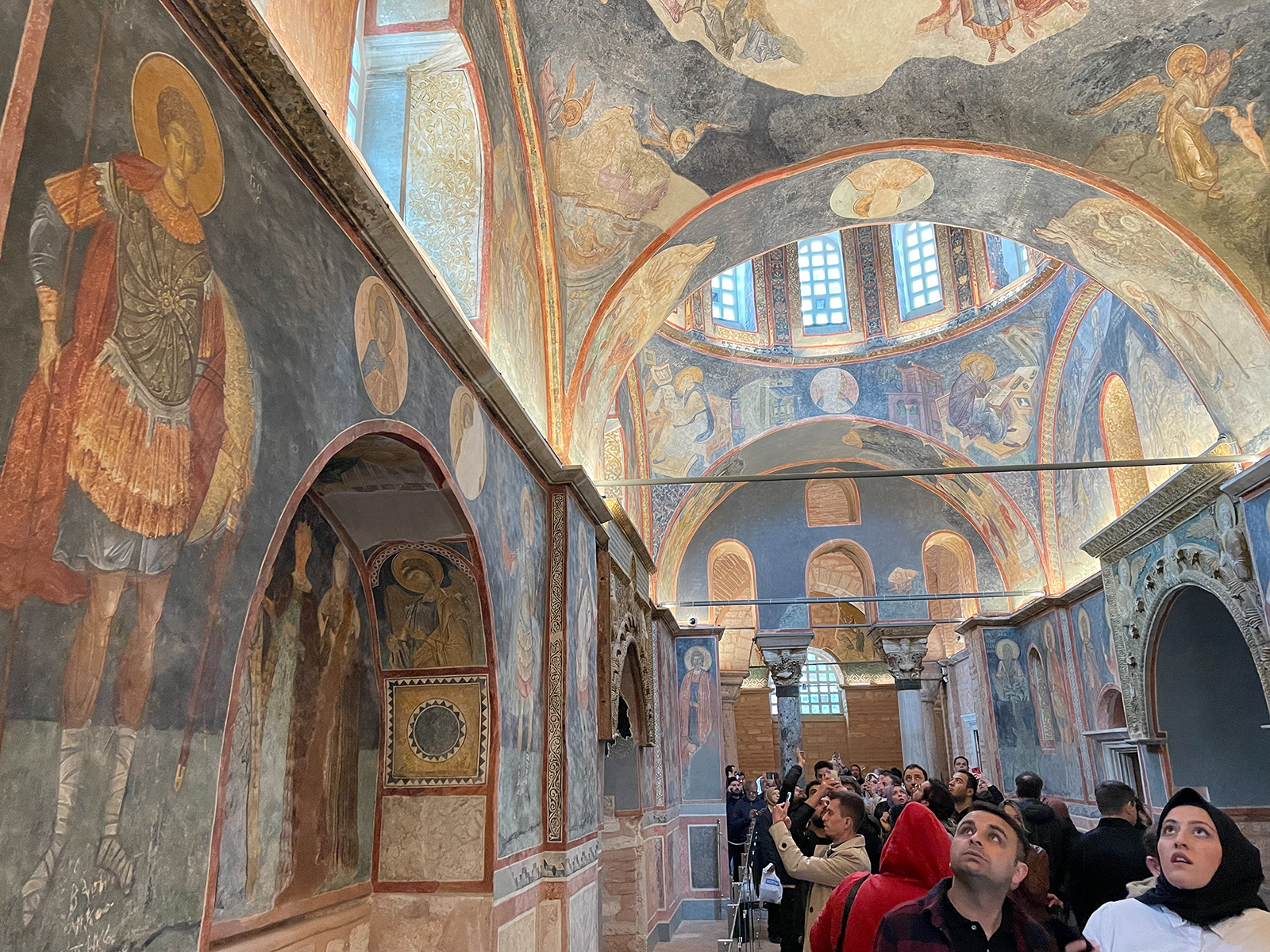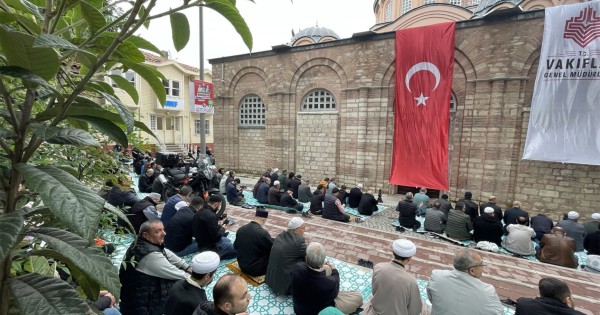Hundreds of worshippers gathered in the narrow streets of Istanbul’s Fatih district on Friday to hear the sounds of Friday prayers echoing from the newly opened Kariye Mosque.
Formerly known as the Chora Church, the site has been used as a museum for the past 79 years, but it is the latest structure to be converted back into a mosque by President Recep Tayyip Erdogan’s government, following the renovation of Hagia Sophia in 2020. While many Turkish Muslims see it as a victory, the Greek Orthodox Church has denounced it as an “ill-advised decision” that “makes a mockery of the Turkish government’s commitment to religious tolerance and religious freedom.”
The renovation of the Chora was announced shortly after that of Hagia Sophia, but its opening for worship was delayed by years of restoration work.
Attendance at the first Friday prayer in Kariye was relatively quiet compared to the hundreds of thousands who flocked to Hagia Sophia, where prayer rugs filled the streets for blocks away. By contrast, Friday attendance was relatively average for a mosque in a more religiously conservative part of Istanbul, where Friday worshippers often spill into the streets.
Both the Chora Church and Hagia Sophia are Byzantine structures dating back to the 4th century. They were Christian holy sites for almost 1000 years until they were converted into mosques by the Ottomans who conquered Constantinople in the 15th century. Despite their conversion, they continued to be worshipped by Orthodox believers. After the establishment of the secular Turkish Republic in the early 20th century, it was decided that both would not become mosques or churches, but simply museums.
“Both Hagia Sophia and the Chora embody a Byzantine and Ottoman past and have become symbols of coexistence and multi-religious life. Their renovation fundamentally implies a hierarchy, prioritizing the Islamic past over all others, be they Greek Orthodox, Armenian, Jewish or Syriac,” Ozgur Kaymak, a lecturer at Istanbul’s MEF University who studies minority rights, said in an email.
The rededication of these sites as mosques marks more than a simple change of status: Islamic tradition forbids the placement of artwork depicting human figures in places of prayer, whereas Orthodox churches feature icons of Christ, saints and other biblical figures.
At Hagia Sophia, mosaics of Jesus and Mary have been covered by curtains since the renovation. President Erdogan had promised that the Hagia Sophia would remain free for all visitors, but Turkey broke that promise earlier this year, charging tourists again and restricting access to the upper floors, leaving the ground floor reserved for Muslim worshippers.
Observers have also criticized Turkey’s Directorate of Religious Affairs’ management of the site, pointing to damage that did not exist when the site was under the jurisdiction of the Ministry of Culture and Tourism.
Although the Chora is significantly smaller than Hagia Sophia, it contains some of the best-preserved examples of late Byzantine art, including mosaics, icons and frescoes, and is a UNESCO World Heritage Site.
“For us, this place is very important because it reminds us of our culture and traditions,” said Evangelos Markantonis, an Orthodox priest who was guiding a group of theology students through Chora on Friday. “We can’t worship as Orthodox, but we have to try to find things that unite us. Only through dialogue and good deeds can we continue to live.”
Erdogan has long rejected calls from the right to convert churches like Hagia Sophia and Hora, and in 2019 urged his supporters to fill the nearby Sultan Ahmed Mosque, also known in English as the Blue Mosque, before telling them they needed to pray at Hagia Sophia.
Nevertheless, he has made a comeback in 2020.
“Dear citizens, the conquest of Istanbul and the conversion of Hagia Sophia into a mosque are among the most glorious events in the history of Turkey,” Erdogan said in his speech inaugurating Hagia Sophia as a mosque. “This is the most honorable day awaited by Islam. Greece’s Constantinople has become Turkey’s Istanbul,” he added, quoting Turkish poet Nazim Hikmet.

Tourists tour the Kariye Mosque (formerly the Chora Church) in Istanbul, Turkey, on May 10. (RNS Photo/David I. Klein)
Chora’s opening as Kariye Mosque comes just weeks after President Erdogan’s Justice and Development Party (AKP) suffered its biggest defeat in two decades in Turkey’s nationwide municipal elections.
“The recent conversion of Hora into a mosque could be the result of Erdogan’s many issues, including geopolitical power politics, his appeal to religious nationalism to regain popularity after the March elections, or a strategy to divert attention from Turkey’s economic downturn,” Kaymak said.
Many analysts attributed the AKP’s defeat to a loss of votes from the Islamist-leaning New Welfare Party, which has been pressuring Erdogan over his handling of the Israel-Hamas war and the humanitarian situation in the Gaza Strip.
Muslim worshippers visiting the mosque on Friday said they considered the mosque’s rededication as an Islamic holy site a national victory for Turkey.
“This mosque is one of the symbols of conquest. We feel proud and happy. It has very beautiful frescoes inside. It was also beautifully renovated before it was closed. May it be good for our country and its people,” bystander Ahmet Oteyuzorg told Turkish media.
“I thank God for these days, not everyone gets this opportunity in their lifetime,” another passerby named Mehmet Celik told Turkish news agency Anadolu, referring to being able to pray in both the rededicated Hagia Sophia and Kariye Mosque.
But Greece, the U.S. State Department and Orthodox groups around the world have criticized the decision to convert the building back into a mosque.
“Speaking for all Greek women and men, I want to publicly express our strong dissatisfaction with the totally unnecessary conversion of the historic Byzantine temple, the Chora Monastery, into a mosque, which I believe is a desecration of Istanbul’s very rich history as a crossroads of cultures,” Greek Prime Minister Kyriakos Mitsotakis said shortly before leaving for Turkey for talks with Erdogan.
“We encourage the Turkish government to preserve and ensure access to the sites and buildings that have hosted its various religious communities in a manner that respects their diverse histories,” a State Department spokesman said in response to questions from Greek media.
“The Turkish government’s appropriation of both as the property of one faith community is not only a further demonstration of its contempt for Turkey’s rich Orthodox tradition, but also further endangers the religious freedom of the Ecumenical Patriarchate and the remaining Christians in the land,” the Ecumenical Patriarchate’s archon said in a statement. —Religion News Service


